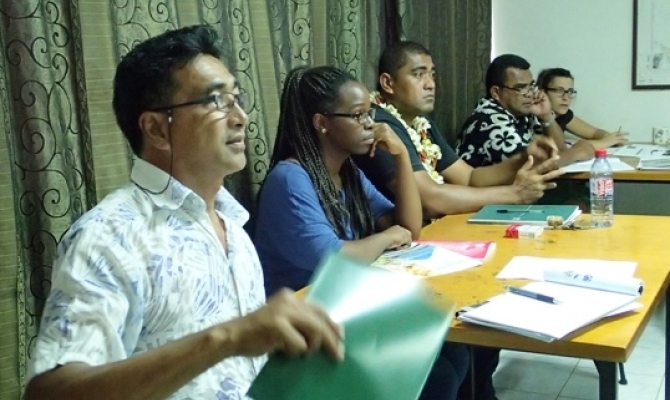
Island and Ocean Ecosystems
Black rats, Norway rats, Polynesian rats, little fire ants, giant African snails, Rosy-wolf snail, mile-a-minute vine, feral dogs, feral cats, giant sensitive weeds, rain trees - the list of species impacting the islands of Wallis and Futuna continues to grow.
A team from the Secretariat of the Pacific Regional Environment Programme (SPREP) and Conservation International (New Caledonia) worked in Wallis with the Environment Service this month, to develop an action plan to address invasive species in the territory.

The two-day workshop engaged 20 stakeholders from various agencies in Wallis and Futuna to prioritise sites and species to manage.
"This is the second visit by SPREP to work with the Environment Service in Wallis and Futuna on this very important issue," said Mr David Moverley, SPREP's Invasive Species Adviser.
"Working alongside our partner, Conservation International, to support the work of our member countries will be beneficial to the people of Wallis and Futuna."
The workshop also builds on the assessment of the environment of Wallis and Futuna being supported by the European Union to all its overseas territories. These environment assessments of EU overseas territories follow similar assessments done for Melanesian, Polynesian and Micronesian countries.
"We are very pleased to be able to work with SPREP on this strategy as it complements the ecosystem profiling work that we are doing under the EU in partnership with IUCN", says Mr. Jean-Christophe Lefeuvre, Director Conservation International based in New Caledonia.
Trees and insects represent the most types of invasive species on the islands, with rats, ants, ornamental plants being the most serious species groups.
The work planning follows similar workshops to help development of National Invasive Species Strategy and Action Plans (NISSAP) held in Kiribati, Niue, Tonga and Vanuatu.

"For Wallis and Futuna, we share similar challenges with other countries in the Pacific. But this also provides us with an opportunity to work together to solve some of the common challenges that are shared by Tonga, Samoa, Niue and Vanuatu", said Mr. Atoloto Malau, Director of Environment Service.
The participation of the public service and local association is critical in this process, and it was good to see a high level of engagement. They were able to identify some of the species of concern, sites that they would like to focus on, and some of the issues such as biosecurity and capacity needs in species identification.
The work plan will continue to be developed, as led by the Environment Services before it is endorsed by the relevant systems of the Territory.
Funding support for the development of this environment strategy and action plans was provided by Fonds Pacifique. The two day workshop was held 20-21 May, 2015.
For more information please contact [email protected]
A team from the Secretariat of the Pacific Regional Environment Programme (SPREP) and Conservation International (New Caledonia) worked in Wallis with the Environment Service this month, to develop an action plan to address invasive species in the territory.

The two-day workshop engaged 20 stakeholders from various agencies in Wallis and Futuna to prioritise sites and species to manage.
"This is the second visit by SPREP to work with the Environment Service in Wallis and Futuna on this very important issue," said Mr David Moverley, SPREP's Invasive Species Adviser.
"Working alongside our partner, Conservation International, to support the work of our member countries will be beneficial to the people of Wallis and Futuna."
The workshop also builds on the assessment of the environment of Wallis and Futuna being supported by the European Union to all its overseas territories. These environment assessments of EU overseas territories follow similar assessments done for Melanesian, Polynesian and Micronesian countries.
"We are very pleased to be able to work with SPREP on this strategy as it complements the ecosystem profiling work that we are doing under the EU in partnership with IUCN", says Mr. Jean-Christophe Lefeuvre, Director Conservation International based in New Caledonia.
Trees and insects represent the most types of invasive species on the islands, with rats, ants, ornamental plants being the most serious species groups.
The work planning follows similar workshops to help development of National Invasive Species Strategy and Action Plans (NISSAP) held in Kiribati, Niue, Tonga and Vanuatu.

"For Wallis and Futuna, we share similar challenges with other countries in the Pacific. But this also provides us with an opportunity to work together to solve some of the common challenges that are shared by Tonga, Samoa, Niue and Vanuatu", said Mr. Atoloto Malau, Director of Environment Service.
The participation of the public service and local association is critical in this process, and it was good to see a high level of engagement. They were able to identify some of the species of concern, sites that they would like to focus on, and some of the issues such as biosecurity and capacity needs in species identification.
The work plan will continue to be developed, as led by the Environment Services before it is endorsed by the relevant systems of the Territory.
Funding support for the development of this environment strategy and action plans was provided by Fonds Pacifique. The two day workshop was held 20-21 May, 2015.
For more information please contact [email protected]